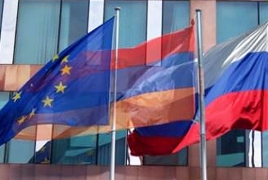Armenia romancing both EU and Russia: EurasiaNet October 14, 2017 - 16:15 AMT PanARMENIAN.Net - Moscow appears angling to reinforce Armenia’s shaken commitment to the Russia-centric economic space, the Eurasian Economic Union, ahead of a key deal between Armenia and the European Union, Eurasianet.org said in a new article on Friday, October 13. The article continues: On October 11, Russian President Vladimir Putin gathered together in Dushanbe with leaders from nine post-Soviet countries, including Armenian President Serzh Sargsyan, to discuss goings-on in the Eurasian Economic Union (EEU), a trade community cobbled together by Moscow as a response to the EU. Russian Prime Minister Dmitry Medvedev is expected to get deeper into the details of this communal economy during a visit to Armenia scheduled for sometime this month. Medvedev will be discussing ways to simplify the movement of goods between Armenia, Russia and the rest of the EEU. Some see these discussions as part of a Russian campaign to reassure doubting Armenia that it made the right choice in 2015 to align itself economically with Russia instead of the EU. From the kickoff, the economic benefits of the EEU relationship have fallen short of Armenian expectations. To counter disenchantment with the pact, Russian media has added its voice to the Kremlin’s efforts. Moscow’s state-financed Sputnik news service this week described the EEU as a chance, courtesy of Russia, for Armenia to restore its Soviet-era prosperity. Moscow is making its moves just before Armenia plans to make a significant step toward the West. Next month, President Sargsyan is expected to visit Brussels to attend a summit of the EU with its Eurasian partners -- Armenia, Azerbaijan, Belarus, Georgia, Moldova and Ukraine. If not at the summit itself, but likely later this year, the EU and Armenia are expected to sign a Comprehensive and Enhanced Partnership Agreement. Described as “ground-breaking,” the deal is, in fact, a compromise on an earlier, failed Association Agreement about political integration and free trade. Pressure from Russia, which is reluctant to see its satellites drift westward, is believed to have led to the Association Agreement’s last-minute collapse in 2013. Heavily reliant on Moscow for security, trade and investment, Yerevan pretty much fled the altar and soon tied the knot with Russia and its EEU. Coming after a four-year chill or, as some put it more charitably, a “strategic pause,” in relations between Brussels and Yerevan, this latest compact is sometimes described as an “Association Agreement lite.” Still a work-in-progress, the treaty reportedly contains the original provisions on political reform and is meant to make sure the EU and Armenia share democratic values, if not an economy. The agreement contains clauses on cooperation between economic sectors, though EEU rules for Armenia will still apply. Russia has not commented publicly on the agreement, but some non-Russian observers believe that it does not object to the deal. In a recent review of Armenia-EU ties, scholars Hrant Kostanyan and Richard Giragosian conjecture that the EEU may try “to leverage Armenia as a potential new platform to engage the EU.” Russia has other ways to exert influence on Armenia’s EU ambitions as well. Economic ties aside, Moscow still acts as the security guarantee for Armenia, sandwiched between foes Azerbaijan and Turkey. Indeed, a new, $100-million export loan for Armenia to purchase Russian weapons is now in the offing. Against that backdrop, Armenia may appear unlikely to move meaningfully toward Western integration. In Dushanbe, President Sargsyan said he is happy with the EEU and wants more of it. But even though Sargsyan’s government has not embraced calls to quit the EEU, lest it anger Moscow, it clearly wants to keep its options open. As Armenia’s second largest trade partner after Russia, the EU, of course, is ready to oblige. Its Commissioner for European Neighbourhood Policy and Enlargement Negotiations, Johannes Hahn, called the accord with Armenia a “blueprint for possible new relationships.” Yet Kostanyan and Giragosian urge caution. The implementation of Yerevan’s EU deal, they warn, could be “as daunting as the negotiations, and perhaps even more difficult.” The EU does not intend to conduct military exercises with Armenia, Lead Spokesperson for EU Foreign Affairs and Security Policy Peter Stano says. A telephone conversation between Putin and Pashinyan before the CSTO summit is not planned, Peskov says. London’s Armenian community has been left feeling “under attack” after the city’s Genocide monument was vandalised. The United States believes there should be an international mission to provide transparency. Partner news |